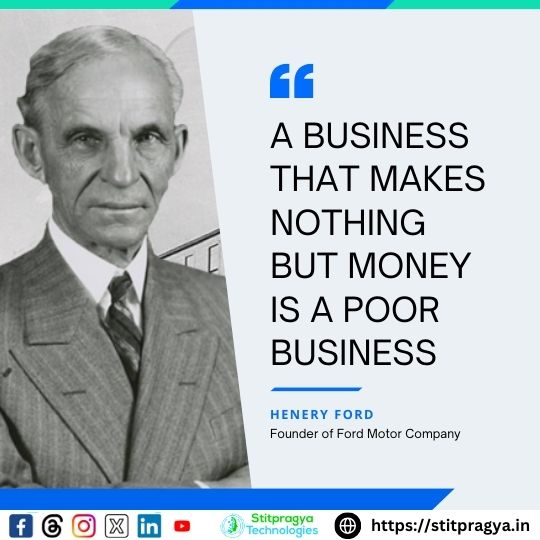Why a Business Focused Solely on Profits Falls Short: Insights from Henry Ford
In today's fast-paced business world, it's easy to get caught up in the pursuit of profit above all else. However, as automotive pioneer Henry Ford once famously said, "A business that makes nothing but money is a poor business." Let's delve deeper into this profound statement and explore why prioritizing profit alone can ultimately lead to shortcomings in business success.
Lack of Purpose:
When profit becomes the sole focus of a business, it often loses sight of its larger purpose. Without a clear mission or values driving its operations, the business may struggle to resonate with customers and employees who seek more than just financial gain.
Limited Innovation:
A profit-driven mentality can stifle innovation and creativity within a business. Instead of investing in research and development or exploring new ideas, the focus remains on maximizing short-term gains. This can hinder long-term growth and competitiveness in the market.
Employee Dissatisfaction:
Employees are the heart of any business, and when profit takes precedence over their well-being and job satisfaction, morale can suffer. A company that prioritizes profits above all else may cut corners on employee benefits, training, or work-life balance, leading to disengagement and high turnover rates.
Neglecting Stakeholder Relationships:
Successful businesses recognize the importance of nurturing relationships with all stakeholders, including customers, employees, suppliers, and the community. However, a profit-centric approach may prioritize shareholder returns at the expense of these vital connections, leading to strained relationships and reputational damage.
Vulnerability to Ethical Lapses:
In the relentless pursuit of profit, some businesses may compromise their ethical principles or engage in questionable practices to cut costs or boost revenues. This can result in legal issues, public backlash, and long-term damage to brand reputation.
So, what can businesses learn from Henry Ford's timeless wisdom? It's clear that sustainable success lies in balancing financial objectives with broader societal impact and ethical considerations. By embracing a purpose-driven approach, businesses can create value beyond profits, foster innovation, cultivate engaged employees, build strong relationships with stakeholders, and ultimately thrive in a competitive marketplace.
Conclusion
In conclusion, let's heed Henry Ford's insightful words and strive to build businesses that are not only financially prosperous but also enrich the lives of others and contribute positively to the world around us. After all, true wealth is measured not just in dollars and cents but in the impact we make on society and future generations.


